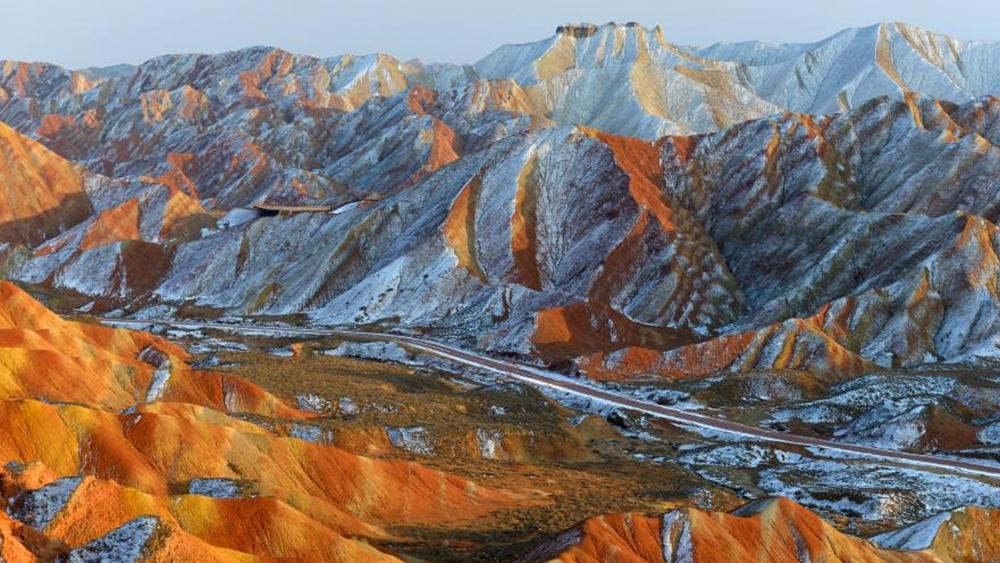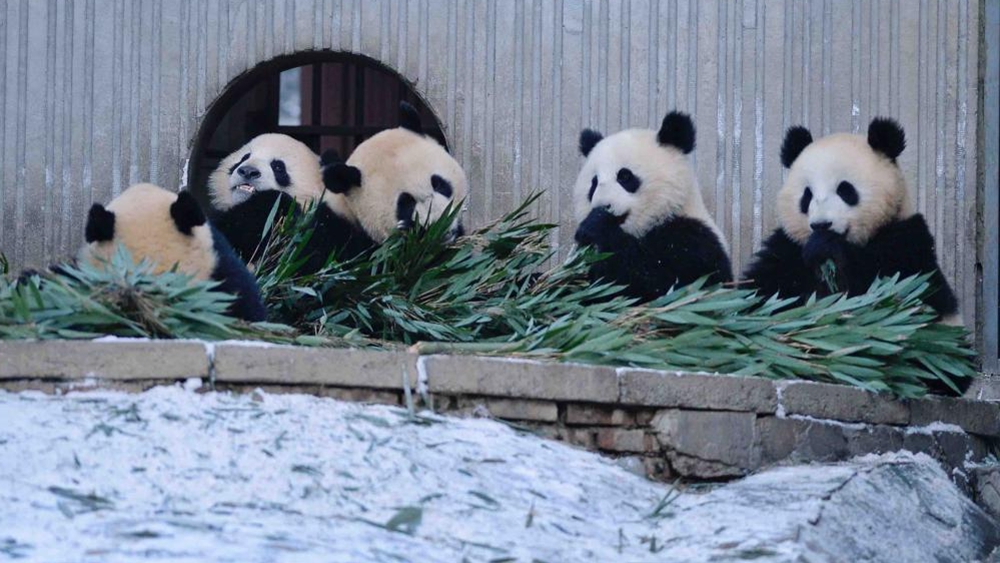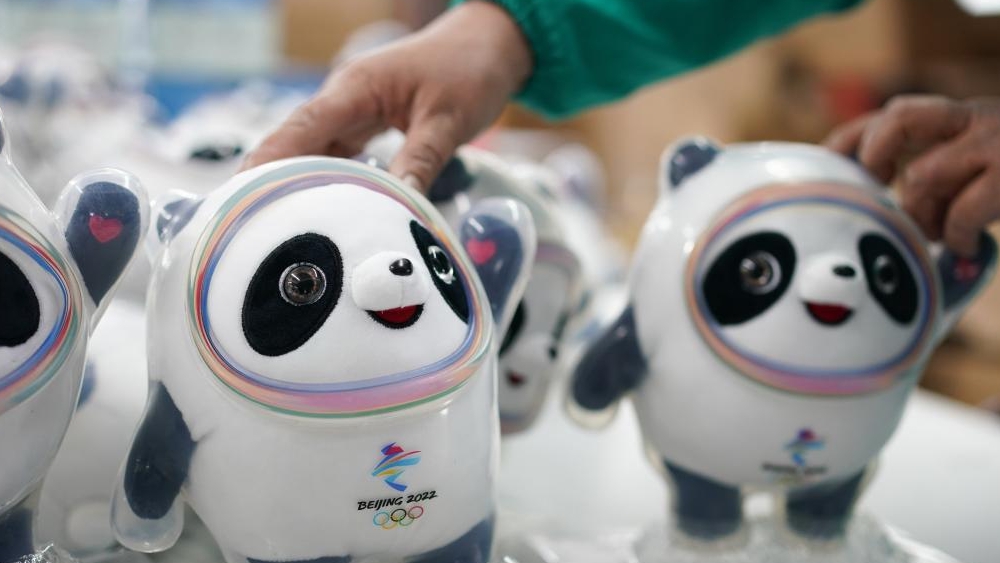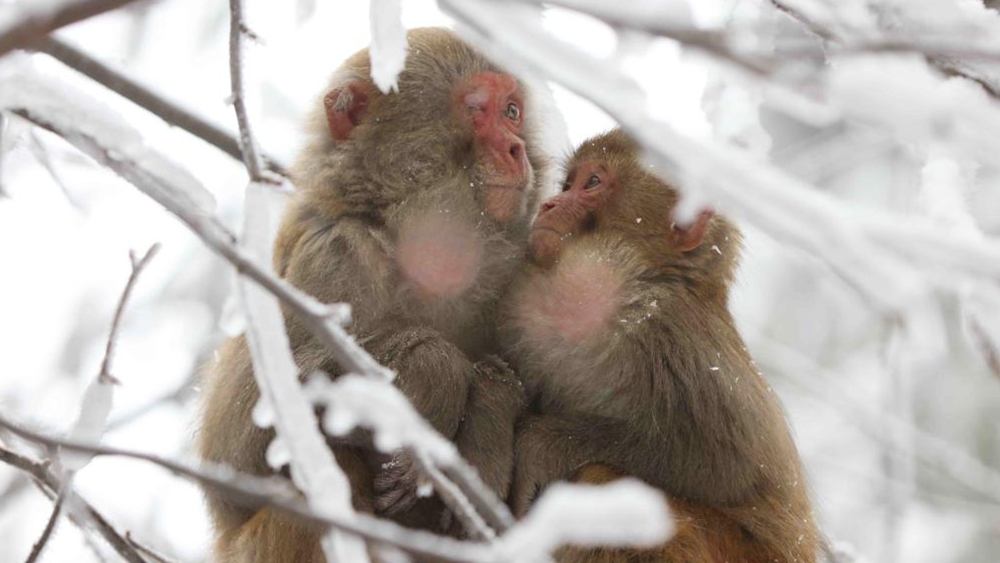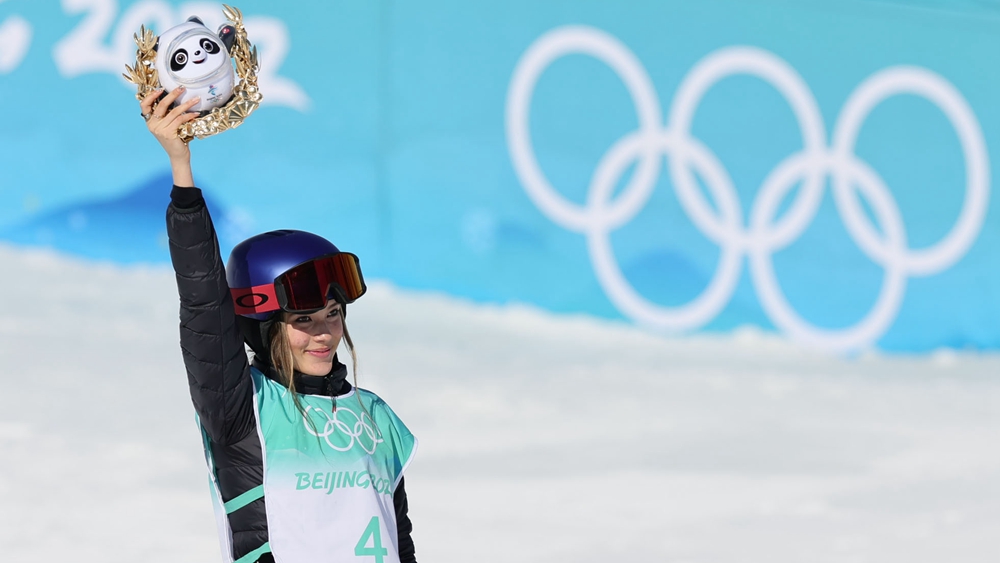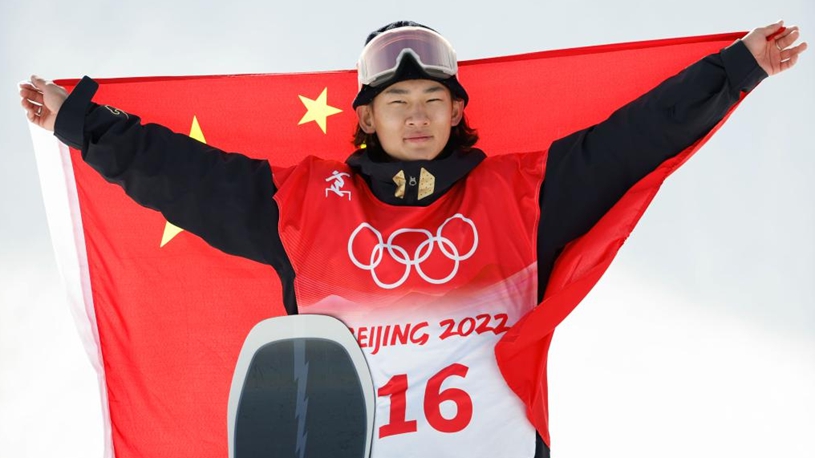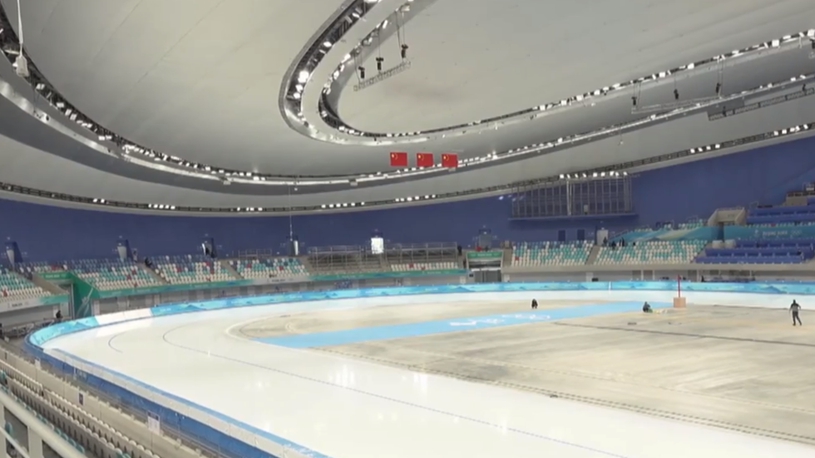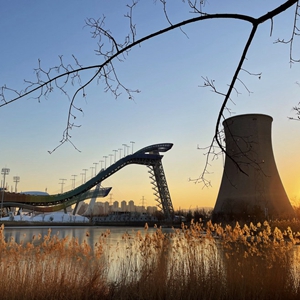-- While pursuing green development, the "dual Olympic city" also strives to present a more open, inclusive and cheerful Games for athletes, volunteers and spectators.
-- Even though with home-field advantages, the country decided to set no targets or quota of medals for Chinese athletes, a move believed to represent the aspirations of the Chinese people and consistent with the Olympic spirit.
-- From power supply equipment to ice-making technology, China extended its warm welcome to foreign enterprises as an indispensable role in its Winter Olympic stories.
BEIJING, Feb. 12 (Xinhua) -- When Gu Ailing competed for her first Olympic gold medal at Shougang Big Air Tuesday, the image of Olympic rings, steampunk-style cooling towers and "flying skiers" have stunned the world.
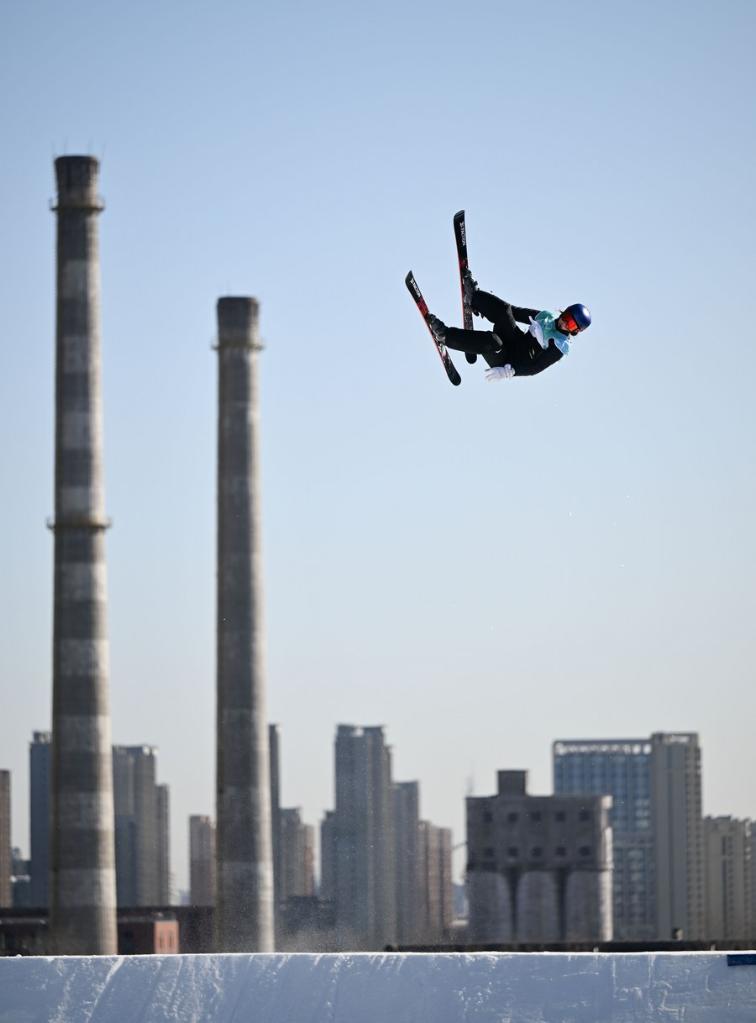
Gu Ailing of China competes during women's freeski big air final at Big Air Shougang in Beijing, capital of China, Feb. 8, 2022. (Xinhua/Li Ga)
Converted from the site of a former iron and steel industrial park under Shougang Group, the sporting venue features a backdrop unlike any other and encapsulates China's vision of sustainable development for hosting the Games.
Beijing 2008 provided the old steelworks with an opportunity to relocate and transform. The silos are now the offices of the Beijing Winter Olympics Organizing Committee; an old workshop has become the ice training base for China's national team; the big freestyle ski jump was built next to the cooling towers.
While pursuing green development, the "dual Olympic city" also strives to present a more open, inclusive and cheerful Games for athletes, volunteers and spectators.
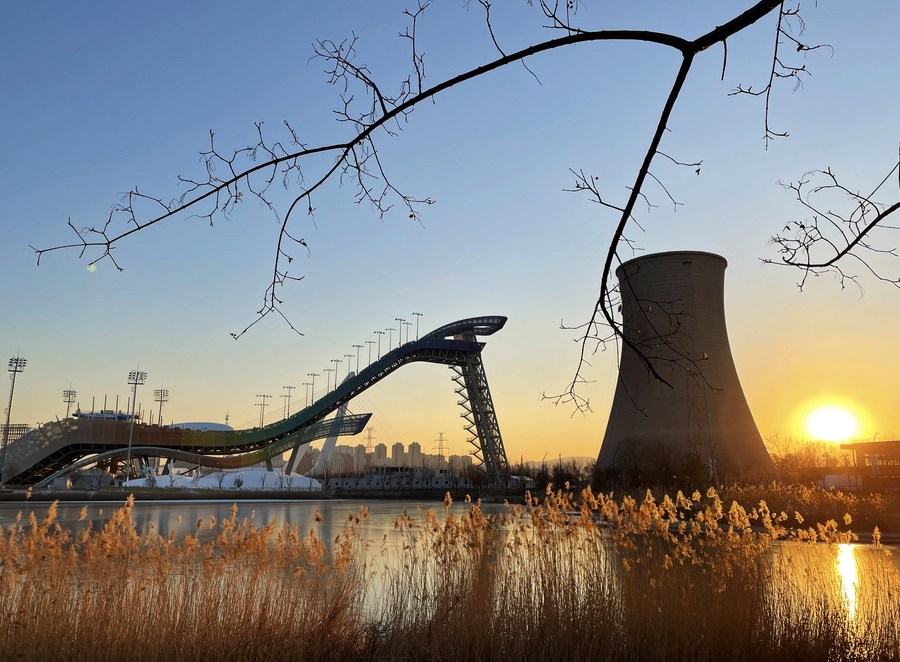
Photo taken on Dec. 28, 2021 shows a view of Big Air Shougang, the venue for Beijing 2022 Winter Olympic Games in Beijing, capital of China. (Xinhua/Tao Xiyi)
GREENER APPROACH
Under clear blue skies, the distant hills on the outskirts of Beijing are clearly visible, a testament to the city's improved air quality.
In recent years, the Beijing-Tianjin-Hebei region and its surrounding areas have accelerated industrial, energy, and transportation restructuring, and carried out comprehensive efforts to control air pollution.
As a result, the average concentration of PM2.5 pollutants in Beijing dropped from 89.5 micrograms per cubic meter to 33 micrograms per cubic meter from 2013 to 2021, and the number of days of heavy pollution in a year dropped from 58 to eight, data from the Ministry of Ecology and Environment shows.
In addition to the blue skies, there is green electricity.

Staff members of the State Grid Beijing Electric Power Company check devices of Zhangbei renewable energy flexible direct current grid in Beijing, capital of China, Sept. 25, 2021. (Xinhua/Li Xin)
Zhangbei renewable energy flexible direct current grid test and demonstration project enables the supply of 100-percent green electricity to the three competition zones in Beijing, Yanqing and Zhangjiakou.
In a period from the beginning of green electricity supply in early 2019 to the closing of the Beijing 2022 Paralympic Winter Games, the project is expected to save 128,000 tonnes of coal from burning, reducing the emission of carbon dioxide by 320,000 tonnes.
Yet this isn't the whole story. Not only has China cut greenhouse gas emissions, it also put them to good use. Five of the nine ice rinks in the Games' competition venues use CO2 in ice-making, marking the first time natural CO2 refrigeration system has been used in the Olympics.
Song Jiafeng, an engineer on the National Speed Skating Oval project, said that using carbon dioxide as a refrigerant can increase ice-making efficiency by 30 percent and save around two million kilowatts of electricity per year.
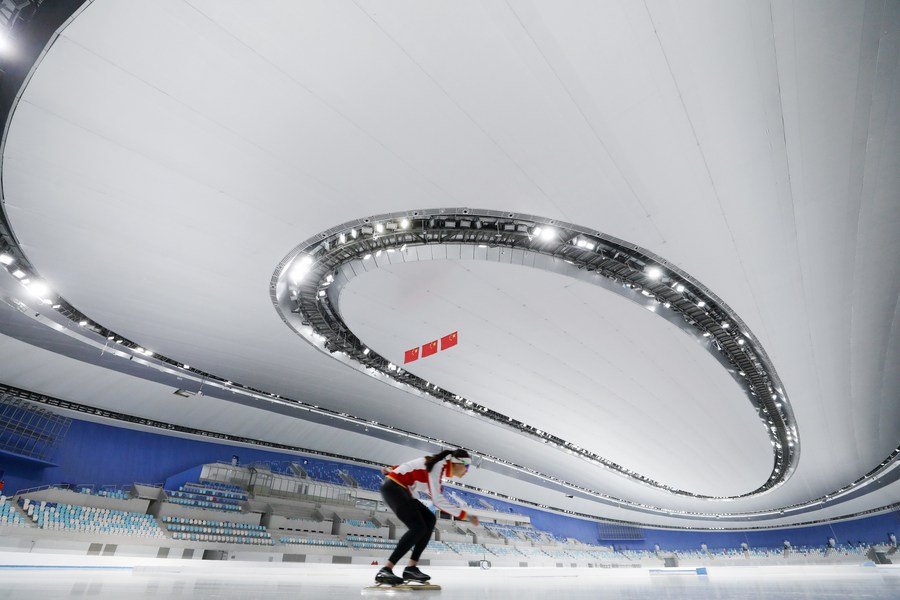
A staff member skates at the National Speed Skating Oval after the stadium's first ice-making operation in Beijing, capital of China, Jan. 19, 2021. (Xinhua/Zhang Chenlin)
This practice has won praise from the International Olympic Committee (IOC). Pierre Ducrey, IOC Olympic Games Operations Director, commended Beijing's choice as an "important and responsible decision."
The decision will be a very strong asset to support Beijing 2022 sustainability ambitions and commitments as regards Olympic venue infrastructure, according to Ducrey.
MORE CHEERFUL GAMES
From the first moments of the opening ceremony, Beijing 2022 has been an unforgettable experience for spectators and athletes alike.
Leon Vockensperger, a snowboarder from Germany, shared his excitement about the opening ceremony with a video post on social media. "I'll remember this moment for the rest of my life," the video caption reads. The footage showed him fist-bumping with a volunteer while marching into the stadium.
In the sporting arena, warm and tearful moments have also stolen some limelight of the adrenaline-pumping competitions.
For example, after winning a history-making silver medal in snowboard slopestyle, 17-year-old Chinese snowboarder Su Yiming decided to give champion Max Parrot and bronze medal winner Mark McMorris each a big hug, sharing his excitement with two Canadian athletes who Su regards as his "idols and heroes."
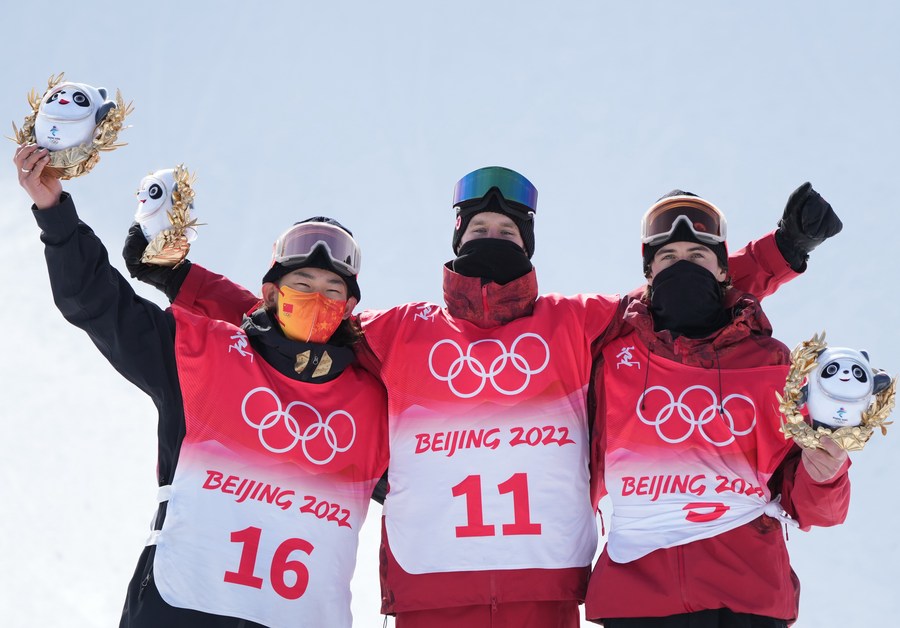
Su Yiming (L) of China, Max Parrot (C) and Mark McMorris of Canada pose during the flower ceremony after men's snowboard slopestyle final at the Genting Snow Park in Zhangjiakou, north China's Hebei Province, Feb. 7, 2022. (Xinhua/Yang Shiyao)
The solidarity among athletes has won huge praise from Chinese netizens.
Regardless of the boundaries and nationalities, Chinese people cheered for every athlete crossing the finish line in the cross-country skiing competitions, expected Japan's figure skater Yuzuru Hanyu to accomplish the seemingly impossible quadruple axel, and directed uplifting comments to Birk Ruud of Norway, the gold medalist in men's freeski big air, for taking his national flag on his final run.
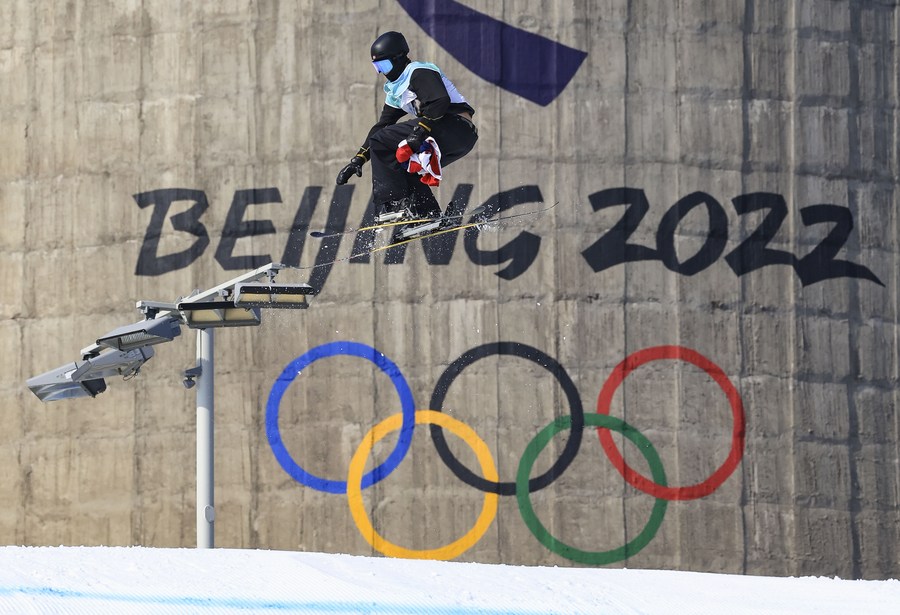
Birk Ruud of Norway competes during the freestyle skiing men's freeski big air final at Big Air Shougang in Beijing, capital of China, Feb. 9, 2022. (Xinhua/Liu Xu)
As the host of the Games, China has been upholding a scientific, healthy, and open-minded value in participating in the Olympics. Even though with home-field advantages, the country decided to set no targets or quota of medals for Chinese athletes, a move believed to represent the aspirations of the Chinese people and consistent with the Olympic spirit.
The new generation of Chinese athletes are sanguine about the results and are more focused on enjoying the experience.
"Have fun!" It was what Su told Gu Ailing, who would later compete in a final with the world's top players. "Do your best and you will definitely receive wonderful results," Su said, showcasing the confidence and pizzazz toward the competition.
Such an attitude is also adopted by Chinese netizens. "It's okay, you already did your best," reads one comment on Chinese microblogging site Sina Weibo, after Chinese athlete Ren Ziwei failed to enter the men's 1500m final of short track speed skating on Wednesday.
MORE OPEN AND INCLUSIVE CHINA
China's national treasure, the panda, was once again chosen as a mascot. Bing Dwen Dwen quickly built up a fanbase across the world. Prince Albert II of Monaco, father of twins, was gifted a Bing Dwen Dwen figurine in Beijing, and asked for one more for his children.
Cao Xue, head of the mascot design team, did not expect so much passion for their work.
What makes Bing Dwen Dwen different from previous mascots is its ice shell. According to the introduction at the Olympics official website, the mascot represents "China's hospitality for athletes and spectators."
"Bing Dwen Dwen is a design we made for the world and the future," Cao said. "Under the mascot's ice shell lies softness and warmth."
Behind the idea of the mascot is Cao's over 20 years of life in south China's Guangzhou, a pioneer of China's reform and opening up in the late 1970s. The city's openness and inclusiveness inspired the design, he said.
Beijing officially announced its bid to the IOC as a candidate city for the 2022 Olympic Winter Games in 2013, which is also the year the country proposed the Belt and Road Initiative, a major platform for international development cooperation.
Since then, China's vision for further opening up has been consistent with the country's efforts to host its first Winter Olympics. From power supply equipment to ice-making technology, China extended its warm welcome to foreign enterprises as an indispensable role in its Winter Olympic stories.
"We have strong confidence in the Chinese market," said Tetsuro Homma, executive vice president of Panasonic Corporation, provider of technical services for Beijing 2022 venues and the Games' broadcasting.
As China has fulfilled the pledge to engage 300 million people in winter sports, stirring up the boom of pursuing a healthier lifestyle, global enterprises saw a huge market for winter sports.
German winterwear brand Bogner announced a joint venture with Chinese apparel group Bosideng at the end of last year. The alliance will lead to the establishment of a digital presence and the opening of 80 stores over the next five years.
The ongoing fever for the panda mascot is exactly a result of China's success in introducing winter sports to more, said Zhao Weidong, spokesperson for the Beijing Organizing Committee for the 2022 Olympic and Paralympic Winter Games.
(Video reporters: Wu Zhangwei, A Sigang; Video editors: Zhu Cong, Wei Yin)■

